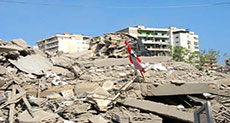
Haaretz: Ehud Olmert Failed in War and Peace

Source: Al-Manar TV, 31-7-2008
"Israeli" Prime Minister Ehud Olmert "came into office in a storm, with the collapse of Ariel Sharon, and is departing in a storm of police investigations," "Israeli" daily Haaretz said in an analysis of Olmert's announcement on Wednesday that he would not run for reelection in the Kadima primary on September 17.
According to Haaretz, Olmert's tenure "was diverted from its path on June 25, 2006, the day Gilad Shalit was detained to the Gaza Strip, and crashed completely two and a half weeks later, with the detention of Ehud Goldwasser and Gilad Regev by Hizbullah." The detentions transformed him from being Sharon's successor, who intended to continue the process of disengagement, into the leader of a nation at war.
But the "Israeli" daily pointed out that Olmert failed this test three times: in the appointment of Amir Peretz as Defense (War) Minister, in his rushed decision to embark on the July war against Lebanon, and in his decision to continue the war that had lost its point after the first strike of fire.
Moreover, according to Haaretz, the helplessness of the government during the war, the serious shortcomings in the conduct of the army, wore down the meager popularity of Olmert. "The public was tired of him, and did not want his leadership, even when he tried to lead the country in a different direction," Haaretz highlighted.
Meanwhile, the irony in the whole issue for Haaretz is that Tzipi Livni and Shaul Mofaz, who are contending to be Olmert's successors, are the ones who offered him ways out during the war. Livni suggested avoiding an escalation and bringing the offensive to an end a few days after it had started; Mofaz suggested an operation that may have saved "Israel" the frontal assault and spared the many casualties in the final week of the war.
"The disappointment of the public as a result of the war only became deeper as the corruption cases turned into an avalanche," Haaretz concluded.
"Israeli" Prime Minister Ehud Olmert "came into office in a storm, with the collapse of Ariel Sharon, and is departing in a storm of police investigations," "Israeli" daily Haaretz said in an analysis of Olmert's announcement on Wednesday that he would not run for reelection in the Kadima primary on September 17.
According to Haaretz, Olmert's tenure "was diverted from its path on June 25, 2006, the day Gilad Shalit was detained to the Gaza Strip, and crashed completely two and a half weeks later, with the detention of Ehud Goldwasser and Gilad Regev by Hizbullah." The detentions transformed him from being Sharon's successor, who intended to continue the process of disengagement, into the leader of a nation at war.
But the "Israeli" daily pointed out that Olmert failed this test three times: in the appointment of Amir Peretz as Defense (War) Minister, in his rushed decision to embark on the July war against Lebanon, and in his decision to continue the war that had lost its point after the first strike of fire.
Moreover, according to Haaretz, the helplessness of the government during the war, the serious shortcomings in the conduct of the army, wore down the meager popularity of Olmert. "The public was tired of him, and did not want his leadership, even when he tried to lead the country in a different direction," Haaretz highlighted.
Meanwhile, the irony in the whole issue for Haaretz is that Tzipi Livni and Shaul Mofaz, who are contending to be Olmert's successors, are the ones who offered him ways out during the war. Livni suggested avoiding an escalation and bringing the offensive to an end a few days after it had started; Mofaz suggested an operation that may have saved "Israel" the frontal assault and spared the many casualties in the final week of the war.
"The disappointment of the public as a result of the war only became deeper as the corruption cases turned into an avalanche," Haaretz concluded.
Comments
- Related News



